Government steps up efforts to ensure safety at borders
GOVERNMENT has stepped up efforts to ensure that all the necessary public health measures are in place at the country’s inland ports of entry ahead of their reopening of on December 1. Zimbabwe closed its borders, including Beitbridge Border Post, to general human traffic in March when President Mnangagwa announced the first 21-day lockdown to curb the spread of Covid-19.
Cabinet, last month, announced the phased reopening of land borders, starting with the country’s main ports of entry — Beitbridge, Plumtree, Victoria Falls, Chirundu, Nyamapanda and Forbes.
However, only private passenger vehicles and pedestrian traffic will be the first to be granted passage from December 1.
The closure of Beitbridge Border Post, the busiest inland port of entry in sub-Saharan Africa that is shared by Zimbabwe and South Africa, affected mostly Zimbabweans who relied on cross-border travel.
There are fears the reopening will put pressure on the human resources and border infrastructure due to ongoing upgrades at the Beitbridge Border Post.
Currently, there are a lot of commercial trucks which are yet to be cleared as most clearing agencies and ancillary Government departments are not operating around the clock.
Some of the key issues that are being addressed include the drilling of boreholes, ensuring that there are adequate ablution facilities, setting up automated thermometers and sanitisers, introduction of wheel and foot baths, establishing testing and screening facilities, as well as providing adequate personal protective equipment (PPE) for frontline workers.
Further assessments for handling public passenger transport would be undertaken.
In an interview yesterday, Chief Coordinator for the National Response to the Covid-19 Pandemic in the Office of the President and Cabinet, Dr Agnes Mahomva, said as part of the measures, boreholes are being drilled and, in some places, bowsers were bringing in water.
“Basically, we are looking at ensuring that all our border posts have got good sources of water for washing, and also trying to ensure that adequate ablution facilities are available not for just travellers, but for workers as well. The idea is to ensure there is enough water and those are some of the initiatives that are being looked into ahead of the reopening of border posts,” she said.
Dr Mahomva said as part of Government innovative initiatives, they are looking at key issues and strengthening them through putting mechanisms in place to address all the challenges that have been identified at the ports of entry, particularly the water situation.
“If you’re talking of Covid-19, you need water, good ablution facilities, enough space for social distancing.
“The very things that we are talking about every single day are the things we are continuously assessing and making sure they are monitored and adhered to, and people should adhere to those recommended measures,” she said.
Dr Mahomva said despite Cabinet approval for the reopening of land borders on December 1, there was room for Government to review its decision depending on the situation obtaining on the ground, particularly in light of a spike in Covid-19 cases in the country.
“That process (reopening of borders) is happening, but nothing is set in stone because how this virus is spreading is a moving target. So, we will continue to review and decide on whether to continue with plans made earlier or not,” said Dr Mahomva.
She said the reopening of the border posts is a preliminary idea, which can be changed depending on the situation on the ground.
“We are looking at the public health measures to see if they are in place or strengthened. When we have those measures in place, we will be ready, but I can’t tell you now.
“We have continued to make sure there is enough water in a number of those places, provision of PPE for workers,” said Dr Mahomva.
“We are very serious when we say we really need to quickly review and ensure that those issues are in place at every border post. It is so critical and I don’t think I can be definite in telling you when we will effect that process.”
Dr Mahomva said there was also a need to address the issue of quarantine centres ahead of reopening of borders.
“When the numbers of returnees started going down as well as the reopening of schools, which were being used as quarantine facilities, we had our quarantine facilities numbers going down.
“We are innovative and those are some of the things that we are looking at when we are saying are all public health measures in place? If we don’t have these facilities, we will look around and see if we can improvise since we don’t have permanent quarantine facilities that are always there at any given time,” she said. — -herald.cl.zw










